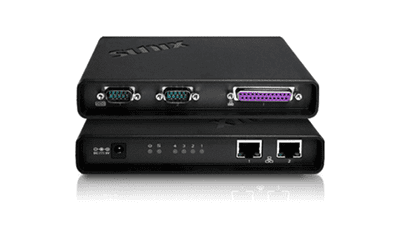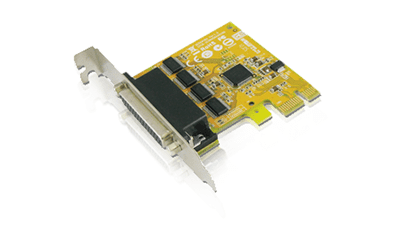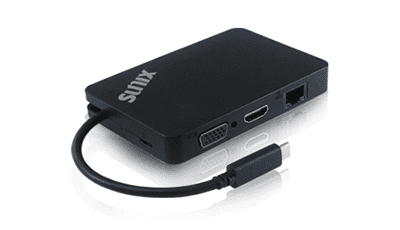Hailo AI Processor for ADAS & AD
AI-Powered Driving Automation
Since the invention of the first car, safety has been the driver for innovation and progress in the automotive industry. These days, machine learning is harnessed to further drive safety in automotive, but also to enable efficiency and convenience for drivers. Machine learning is applied in both Advanced Driver Assistance Systems (ADAS) and in autonomous driving (AD), which rely on AI algorithms to analyze and interpret data from cameras and other perception sources, like radars and LiDARs to navigate roads and make driving decisions.
These enhancements also find their ways to lightweight vehicles, motorcycles and bicycles, as well as off-road vehicles, giving rise to different sets of applications that go beyond driving on a motorway.
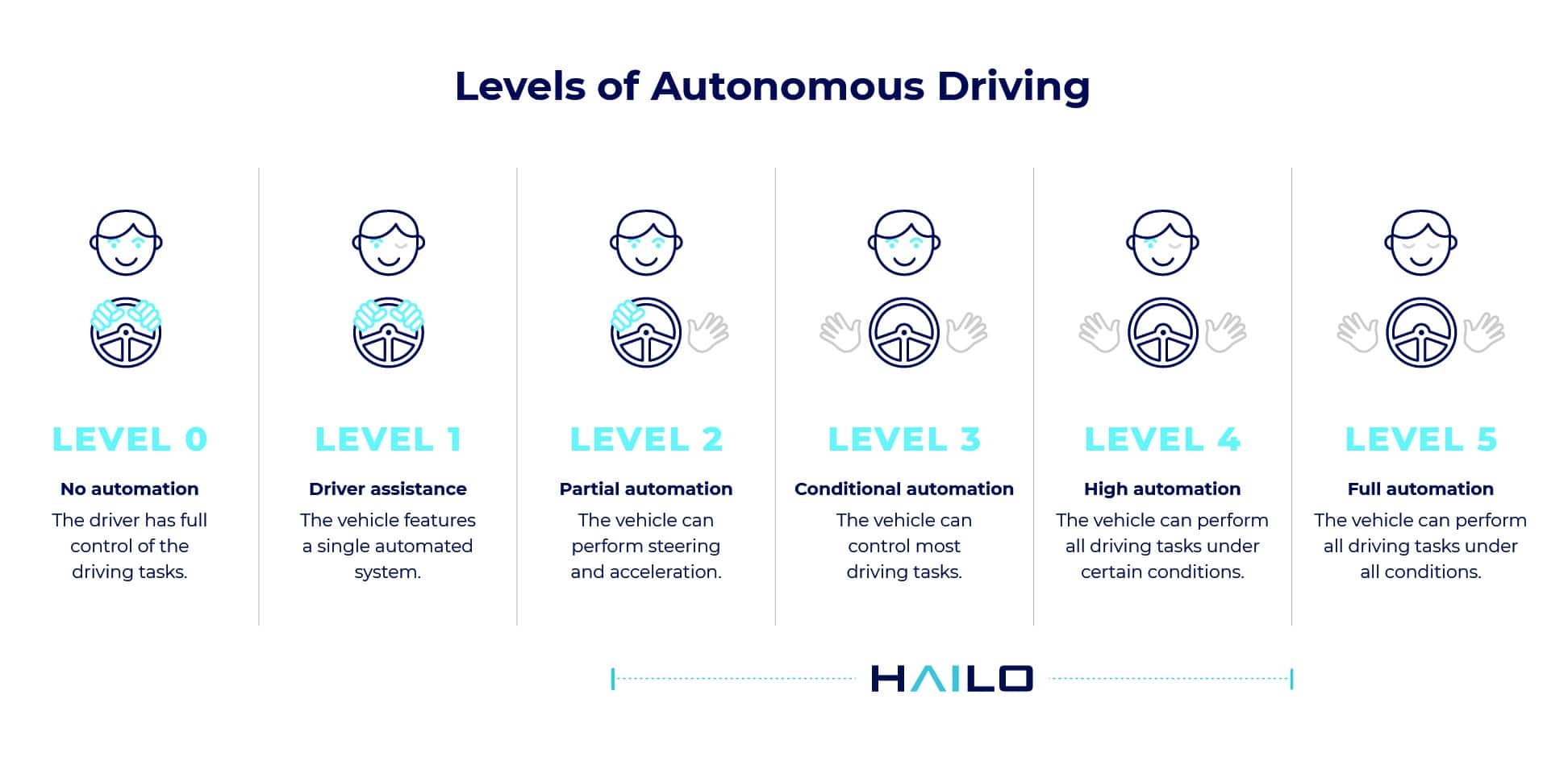
Driving Automation on the Edge
From lane keeping to traffic jam assistת to highway pilot, and eventually to urban pilot – a compute-intense AI-focused machine is needed, which needs to process input from multiple sensors to create a reliable 360-degree situational awareness and bird’s eye view image of the road in real-time. The system must also meet multiple constraints including thermal dissipation, mass production quality, size and price.
Hailo is working with leading OEMs and Tier-1s who are at the forefront of AI automotive technology, to introduce state-of-the-art leading deep learning performance into various assisted and autonomous driving systems, while meeting evolving safety standards and regulations. The Hailo AI processor is an AEC-Q100 grade 2 qualified Automotive AI accelerator, which has been developed in accordance with ISO26262 guidelines to meet ASIL-B conformance.
Benefits:
High AI Compute Power
Hailo’s dedicated AI processors provide the high power-efficiency (high processing throughput per unit of power) that allows to pack more AI processing into the vehicle, making it possible to scale the AI compute to the required level of autonomy
![]()
Thermal Efficiency
The Hailo processors enable high AI compute power at an exceptional power consumption of as low as 2.5 W, eliminating the need for active cooling
![]()
Cost Efficiency
The Hailo AI processors are specifically designed for processing NN models at a very efficient usage of the silicon area, resulting in low cost per processing unit ($/FPS). As the Hailo processor does not typically require external memory and consumes a very low amount of power, significant cost reduction can be achieved on RBoM and thermal solution for heat dissipation
![]()
Openness
Open and agnostic software ecosystem, allowing OEMs and Tier1s control and innovation in their ADAS and AD applications
Proposed Solution Outline
Hailo offers maximum flexibility and AI compute scalability in ADAS/AD ECU design, by combining automotive SoCs with the Hailo AI processor or multiple processors, depending on the number of sensors and complexity of models.
One small, low-power Hailo chip is able to process multiple video streams and multiple chips can work in tandem or cascade, all while maintaining industry-leading efficiency and scalability, high processing throughput and low latency. The solution’s flexibility allows the use of different types of camera inputs, ranging in resolution and input size.
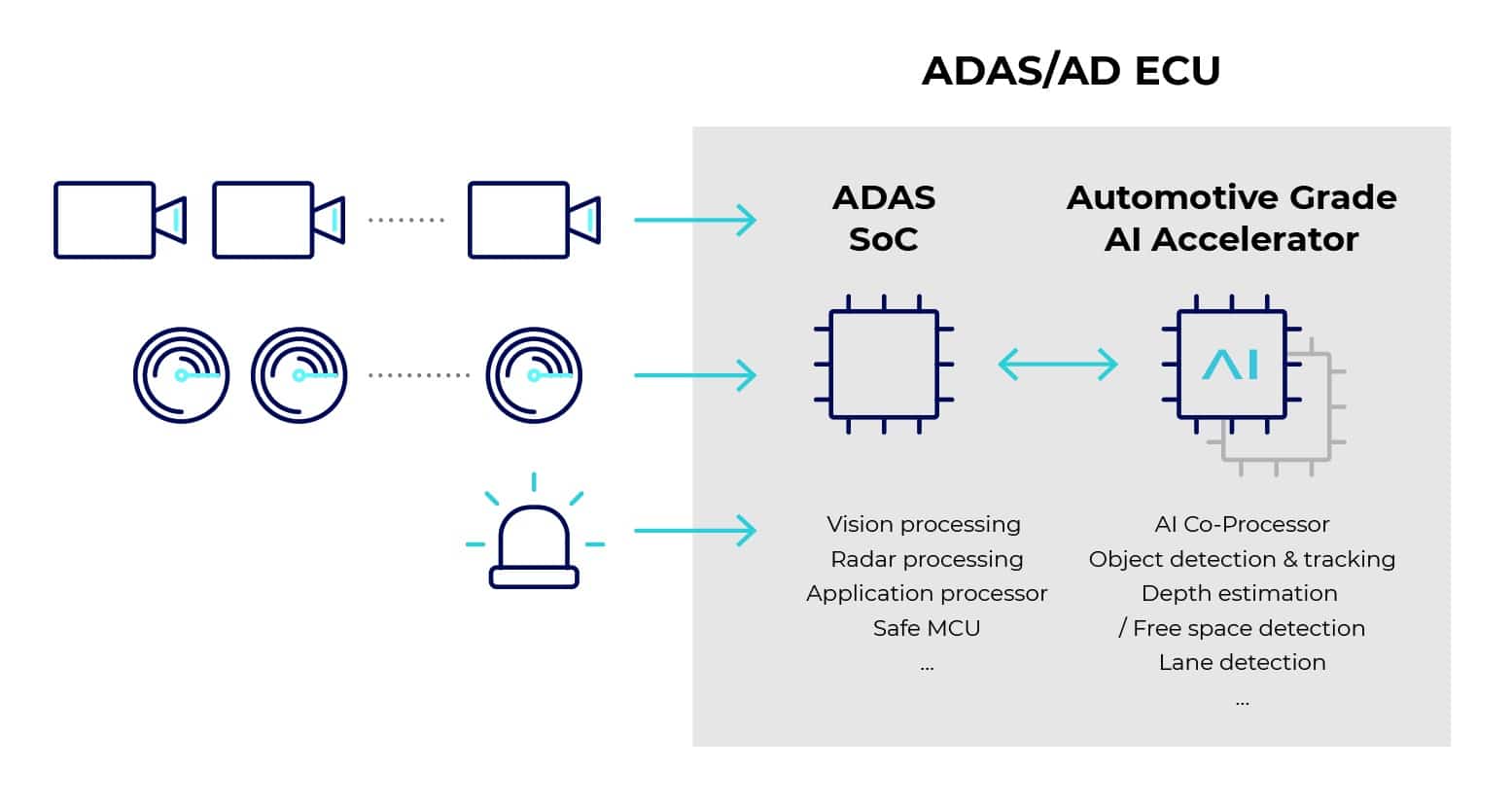
Article source:
https://hailo.ai/zh-hans/applications/automotive/adas-and-ad/#adas-overview
Solutions
AI Inference
Banking
Restaurant / POS
Medical
Security
Factory Automation
CANbus Application
Transportation
Kiosk and Self-service
Public Utilities
Public Utilities
-
Application Video - EV Charging Station
-
Application Video - IoT Environmental Monitoring Solution
-
Currency Printing: Banknote Printing and Counterfeit Banknote Prevention
-
Airport : Airport Environment Monitoring System
-
Water Quality Monitoring : 2008 Beijing Olympics Project
-
Military : Missile Launch Control Testing a nd Simulation System
Hailo AI Processor for ADAS & AD
AI-Powered Driving Automation
Since the invention of the first car, safety has been the driver for innovation and progress in the automotive industry. These days, machine learning is harnessed to further drive safety in automotive, but also to enable efficiency and convenience for drivers. Machine learning is applied in both Advanced Driver Assistance Systems (ADAS) and in autonomous driving (AD), which rely on AI algorithms to analyze and interpret data from cameras and other perception sources, like radars and LiDARs to navigate roads and make driving decisions.
These enhancements also find their ways to lightweight vehicles, motorcycles and bicycles, as well as off-road vehicles, giving rise to different sets of applications that go beyond driving on a motorway.

Driving Automation on the Edge
From lane keeping to traffic jam assistת to highway pilot, and eventually to urban pilot – a compute-intense AI-focused machine is needed, which needs to process input from multiple sensors to create a reliable 360-degree situational awareness and bird’s eye view image of the road in real-time. The system must also meet multiple constraints including thermal dissipation, mass production quality, size and price.
Hailo is working with leading OEMs and Tier-1s who are at the forefront of AI automotive technology, to introduce state-of-the-art leading deep learning performance into various assisted and autonomous driving systems, while meeting evolving safety standards and regulations. The Hailo AI processor is an AEC-Q100 grade 2 qualified Automotive AI accelerator, which has been developed in accordance with ISO26262 guidelines to meet ASIL-B conformance.
Benefits:
High AI Compute Power
Hailo’s dedicated AI processors provide the high power-efficiency (high processing throughput per unit of power) that allows to pack more AI processing into the vehicle, making it possible to scale the AI compute to the required level of autonomy
![]()
Thermal Efficiency
The Hailo processors enable high AI compute power at an exceptional power consumption of as low as 2.5 W, eliminating the need for active cooling
![]()
Cost Efficiency
The Hailo AI processors are specifically designed for processing NN models at a very efficient usage of the silicon area, resulting in low cost per processing unit ($/FPS). As the Hailo processor does not typically require external memory and consumes a very low amount of power, significant cost reduction can be achieved on RBoM and thermal solution for heat dissipation
![]()
Openness
Open and agnostic software ecosystem, allowing OEMs and Tier1s control and innovation in their ADAS and AD applications
Proposed Solution Outline
Hailo offers maximum flexibility and AI compute scalability in ADAS/AD ECU design, by combining automotive SoCs with the Hailo AI processor or multiple processors, depending on the number of sensors and complexity of models.
One small, low-power Hailo chip is able to process multiple video streams and multiple chips can work in tandem or cascade, all while maintaining industry-leading efficiency and scalability, high processing throughput and low latency. The solution’s flexibility allows the use of different types of camera inputs, ranging in resolution and input size.

Article source:
https://hailo.ai/zh-hans/applications/automotive/adas-and-ad/#adas-overview
Solutions
AI Inference
Banking
Restaurant / POS
Medical
Security
Factory Automation
CANbus Application
Transportation
Kiosk and Self-service
Public Utilities
Public Utilities
-
Application Video - EV Charging Station
-
Application Video - IoT Environmental Monitoring Solution
-
Currency Printing: Banknote Printing and Counterfeit Banknote Prevention
-
Airport : Airport Environment Monitoring System
-
Water Quality Monitoring : 2008 Beijing Olympics Project
-
Military : Missile Launch Control Testing a nd Simulation System
Hailo AI Processor for ADAS & AD
AI-Powered Driving Automation
Since the invention of the first car, safety has been the driver for innovation and progress in the automotive industry. These days, machine learning is harnessed to further drive safety in automotive, but also to enable efficiency and convenience for drivers. Machine learning is applied in both Advanced Driver Assistance Systems (ADAS) and in autonomous driving (AD), which rely on AI algorithms to analyze and interpret data from cameras and other perception sources, like radars and LiDARs to navigate roads and make driving decisions.
These enhancements also find their ways to lightweight vehicles, motorcycles and bicycles, as well as off-road vehicles, giving rise to different sets of applications that go beyond driving on a motorway.

Driving Automation on the Edge
From lane keeping to traffic jam assistת to highway pilot, and eventually to urban pilot – a compute-intense AI-focused machine is needed, which needs to process input from multiple sensors to create a reliable 360-degree situational awareness and bird’s eye view image of the road in real-time. The system must also meet multiple constraints including thermal dissipation, mass production quality, size and price.
Hailo is working with leading OEMs and Tier-1s who are at the forefront of AI automotive technology, to introduce state-of-the-art leading deep learning performance into various assisted and autonomous driving systems, while meeting evolving safety standards and regulations. The Hailo AI processor is an AEC-Q100 grade 2 qualified Automotive AI accelerator, which has been developed in accordance with ISO26262 guidelines to meet ASIL-B conformance.
Benefits:
High AI Compute Power
Hailo’s dedicated AI processors provide the high power-efficiency (high processing throughput per unit of power) that allows to pack more AI processing into the vehicle, making it possible to scale the AI compute to the required level of autonomy
![]()
Thermal Efficiency
The Hailo processors enable high AI compute power at an exceptional power consumption of as low as 2.5 W, eliminating the need for active cooling
![]()
Cost Efficiency
The Hailo AI processors are specifically designed for processing NN models at a very efficient usage of the silicon area, resulting in low cost per processing unit ($/FPS). As the Hailo processor does not typically require external memory and consumes a very low amount of power, significant cost reduction can be achieved on RBoM and thermal solution for heat dissipation
![]()
Openness
Open and agnostic software ecosystem, allowing OEMs and Tier1s control and innovation in their ADAS and AD applications
Proposed Solution Outline
Hailo offers maximum flexibility and AI compute scalability in ADAS/AD ECU design, by combining automotive SoCs with the Hailo AI processor or multiple processors, depending on the number of sensors and complexity of models.
One small, low-power Hailo chip is able to process multiple video streams and multiple chips can work in tandem or cascade, all while maintaining industry-leading efficiency and scalability, high processing throughput and low latency. The solution’s flexibility allows the use of different types of camera inputs, ranging in resolution and input size.

Article source:
https://hailo.ai/zh-hans/applications/automotive/adas-and-ad/#adas-overview
Solutions
AI Inference
Banking
Restaurant / POS
Medical
Security
Factory Automation
CANbus Application
Transportation
Kiosk and Self-service
Public Utilities
Public Utilities
-
Application Video - EV Charging Station
-
Application Video - IoT Environmental Monitoring Solution
-
Currency Printing: Banknote Printing and Counterfeit Banknote Prevention
-
Airport : Airport Environment Monitoring System
-
Water Quality Monitoring : 2008 Beijing Olympics Project
-
Military : Missile Launch Control Testing a nd Simulation System
Hailo AI Processor for ADAS & AD
AI-Powered Driving Automation
Since the invention of the first car, safety has been the driver for innovation and progress in the automotive industry. These days, machine learning is harnessed to further drive safety in automotive, but also to enable efficiency and convenience for drivers. Machine learning is applied in both Advanced Driver Assistance Systems (ADAS) and in autonomous driving (AD), which rely on AI algorithms to analyze and interpret data from cameras and other perception sources, like radars and LiDARs to navigate roads and make driving decisions.
These enhancements also find their ways to lightweight vehicles, motorcycles and bicycles, as well as off-road vehicles, giving rise to different sets of applications that go beyond driving on a motorway.

Driving Automation on the Edge
From lane keeping to traffic jam assistת to highway pilot, and eventually to urban pilot – a compute-intense AI-focused machine is needed, which needs to process input from multiple sensors to create a reliable 360-degree situational awareness and bird’s eye view image of the road in real-time. The system must also meet multiple constraints including thermal dissipation, mass production quality, size and price.
Hailo is working with leading OEMs and Tier-1s who are at the forefront of AI automotive technology, to introduce state-of-the-art leading deep learning performance into various assisted and autonomous driving systems, while meeting evolving safety standards and regulations. The Hailo AI processor is an AEC-Q100 grade 2 qualified Automotive AI accelerator, which has been developed in accordance with ISO26262 guidelines to meet ASIL-B conformance.
Benefits:
High AI Compute Power
Hailo’s dedicated AI processors provide the high power-efficiency (high processing throughput per unit of power) that allows to pack more AI processing into the vehicle, making it possible to scale the AI compute to the required level of autonomy
![]()
Thermal Efficiency
The Hailo processors enable high AI compute power at an exceptional power consumption of as low as 2.5 W, eliminating the need for active cooling
![]()
Cost Efficiency
The Hailo AI processors are specifically designed for processing NN models at a very efficient usage of the silicon area, resulting in low cost per processing unit ($/FPS). As the Hailo processor does not typically require external memory and consumes a very low amount of power, significant cost reduction can be achieved on RBoM and thermal solution for heat dissipation
![]()
Openness
Open and agnostic software ecosystem, allowing OEMs and Tier1s control and innovation in their ADAS and AD applications
Proposed Solution Outline
Hailo offers maximum flexibility and AI compute scalability in ADAS/AD ECU design, by combining automotive SoCs with the Hailo AI processor or multiple processors, depending on the number of sensors and complexity of models.
One small, low-power Hailo chip is able to process multiple video streams and multiple chips can work in tandem or cascade, all while maintaining industry-leading efficiency and scalability, high processing throughput and low latency. The solution’s flexibility allows the use of different types of camera inputs, ranging in resolution and input size.

Article source:
https://hailo.ai/zh-hans/applications/automotive/adas-and-ad/#adas-overview
Solutions
AI Inference
Banking
Restaurant / POS
Medical
Security
Factory Automation
CANbus Application
Transportation
Kiosk and Self-service
Public Utilities
Public Utilities
-
Application Video - EV Charging Station
-
Application Video - IoT Environmental Monitoring Solution
-
Currency Printing: Banknote Printing and Counterfeit Banknote Prevention
-
Airport : Airport Environment Monitoring System
-
Water Quality Monitoring : 2008 Beijing Olympics Project
-
Military : Missile Launch Control Testing a nd Simulation System


